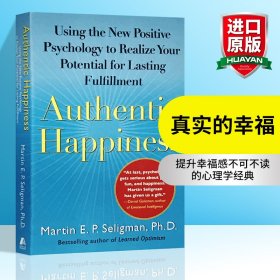
英文原版 Authentic Happiness真实的幸福 英文版 进口英语原版书籍
书籍内容简介可联系客服查阅,查书找书开票同样可以联系客服
¥ 97 ¥ 97 九五品
库存13件
广东广州
认证卖家担保交易快速发货售后保障
作者Seligman, Martin E. P.
出版社Atria Books
ISBN9780743222983
出版时间2003-12
装帧平装
定价97元
货号YB-1211
上书时间2024-03-27
- 最新上架
商品详情
- 品相描述:九五品
- 商品描述
-
内容摘要
书名:Authentic Happiness: Using the New Positive Psychology to Realize Your Potential for Lasting Fulfillment 真实的幸福 作者:Martin E. P. Seligman马丁·塞利格曼 出版社名称:Atria Books 出版时间:2004 语种:英文 ISBN:9780743222983 商品尺寸:14 x 2.3 x 21.4 cm 包装:平装 页数:336 他为一贯忧郁的心理学带来了积极与幸福 他是心流之父希斯特来哈伊的亲密挚友 他是哈佛幸福导师本·沙哈尔的导师 积极心理学之父、以高票数当选的美国心理协会主席的马丁·塞利格曼开创之作,提升幸福感不可不读的心理学经典,销量达到200万册!畅销全球20年。 在哈佛,这是一堂听课人数很多、受欢迎的课程,在IBM、通用电气、壳牌、宝洁、谷歌,这是一堂平衡成功事业和幸福人生的必修课;在英国贵族名校威灵顿公学,这是堂提升人生品质的素质课。 Authentic Happiness《真实的幸福》以一种通俗而不失科学严谨的方式告诉人们,什么是真正的幸福,怎样才能变得更幸福。其实,真正的幸福来源于你对自身所拥有的优势的辨别和运用,来源于你对生活意义的理解和追求,它是可控的。如果你想变得更幸福一些,不妨照着塞利格曼博士的建议来试试:改变对过去的消极看法,重视当下的积极体验以及对未来的积极期望。 推荐理由: 1. 积极心理学之父塞利格曼幸福科学四部曲之一; 2. 央视《读书》栏目连续五天力荐读物; 3. 清华大学心理学系主任,加州大学伯克利分校心理学系终身教授彭凯平倾力推荐。 精彩书评: “塞利格曼的书是新世纪人类行为的指南。看过他的书的人,不管是门外汉还是专业人士都会受惠。这本书不仅包含了具体的自我评估工具,而且语言生动、风趣,道出了活出真我的涵义。”——希斯赞特米哈伊,心流之父 “心理学终于认真地研究了“幸福”。塞利格曼博士送给我们一盏明灯,指引我们不断找寻多姿多彩的生活。”——丹尼尔·戈尔曼,情商之父 “由本世纪创意、影响力的心理学家写成的作品。他在幸福的本质上,阐述了不少精辟的科学见解及个人反思。”——史蒂芬·平克,畅销书《语言本能》的作者 “一本极佳的作品!是本充满实用智慧和真实资料的读物。见解颇具深度,令人叹服!”——史蒂芬·柯维,《高效能人士的七个习惯》的作者 A national bestseller,Authentic Happiness launched the revolutionary new science of Positive Psychology—and sparked a coast-to-coast debate on the nature of real happiness. According to esteemed psychologist and bestselling author Martin Seligman, happiness is not the result of good genes or luck. Real, lasting happiness comes from focusing on one’s personal strengths rather than weaknesses—and working with them to improve all aspects of one’s life. Using practical exercises, brief tests, and a dynamic website program, Seligman shows readers how to identify their highest virtues and use them in ways they haven’t yet considered. Accessible and proven,Authentic Happiness is the most powerful work of popular psychology in years. 过去的50年,心理学只关心一件事——心理疾病,而且做得不错,因为现在我们可以测量抑郁症、精神分裂症、酗酒等过去认为是很模糊的概念,并能做出相当精准的描绘。目前我们已经知道这些问题是怎么发展出来的,包括它们的遗传因子、生物化学性以及心理成因,重要的是我们知道该怎么去治疗这些疾病。根据我新近的统计,在几十种心理疾病中,已经有14种可以用药物及心理治疗方法来进行有效医治(两种可以完全治愈)。 但是这种进步的代价很高:为了要摆脱问题状态,我们会变得更痛苦,甚至还不如以前。人不只是要改正错误或缺点,还希望找出自己的优势和生活的意义。人都不愿意糊里糊涂过一生。你可能会像我一样,午夜梦回,躺在床上想自己的生活是如何越变越幸福,而不是一天天减少痛苦。假如你真像我一样,你可能会对心理学有点失望。但是现在,它终于走到了解积极情绪,建构优势和美德(strength and virtue),为亚里士多德所谓的“美好人生”提供指引的时候了。 In this groundbreaking, heart-lifting and deeply useful book, Martin Seligman, internationally esteemed psychologist and the father of Positive Psychology, shows us that happiness can be learned and cultivated. Using many years of in-depth psychological research he lays out the 24 strengths and virtues unique to the human psyche and teaches you how to identify the ones you possess. By calling upon your signature strengths, you will not only develop natural buffers against misfortune and negative emotion, but also improve the world around you— at work, in love and in raising children— achieving new and sustainable contentment, joy and meaning. 马丁·塞利格曼,美国著名心理学家,积极心理学的创始人,当代认知心理治疗的创始人之一。美国心理学会前主席,主要从事习得性无助、抑郁、乐观主义、悲观主义等方面的研究。从“抑郁专家”到“积极心理学之父”,塞利格曼博士从“习得性无助”中走来,不再只关注人性黑暗、脆弱与痛苦的一面。他发出了“积极心理学”的召唤——帮助普通人增加幸福感。他是一位获美国心理协会两项大奖的学者——威廉詹姆斯奖及詹姆斯卡特尔奖,曾获美国应用与预防心理学会的荣誉奖章,并由于他在精神病理学方面的研究而获得该学会的终身成就奖。现在宾夕法尼亚大学任教,曾登上《纽约时报》《时代周刊》《新闻周刊》等众多流行杂志,著作超过20本,被译成多种语言,畅销全球。 Martin E.P. Seligman, Ph.D., the Robert A. Fox Professor of Psychology at the University of Pennsylvania, works on positive psychology, learned helplessness, depression, ethnopolitical conflict, and optimism. Dr. Seligman’s work has been supported by the National Institute of Mental Health, the National Science Foundation, the Guggenheim Foundation, the Mellon Foundation, and the MacArthur Foundation. He is the director of the Positive Psychology Network and scientific director of Foresight, Inc., a testing company that predicts success in various walks of life. He was for fourteen years the Director of the Clinical Training Program of the University of Pennsylvania and was named a “Distinguished Practitioner” by the National Academies of Practice. In 1995, he received the Pennsylvania Psychological Association’s award for “Distinguished Contributions to Science and Practice.” Preface PartⅠ: Positive Emotion 1. Positive Feeling and Positive Character 2. How Psychology Lost Its Way and I Found Mine 3. Why Bother to Be Happy? 4. Can You Make Yourself Lastingly Happier? 5. Satisfaction about the Past 6. Optimism about the Future 7. Happiness in the Present PartⅡ: Strength and Virtue 8. Renewing Strength and Virtue 9.Your Signature Strength Part Ⅲ: In the Mansions of Life 10. Work and Personal Satisfaction 11. Love 12. Raising Children 13. Reprice and Summary 14. Meaning and Purpose Appendix: Terminology and Theory Acknowledgment Endnotes Index Chapter One: Positive Feeling And Positive Character In 1932, Cecilia O’Payne took her final vows in Milwaukee. As a novice in the School Sisters of Notre Dame, she committed the rest of her life to the teaching of young children. Asked to write a short sketch of her life on this momentous occasion, she wrote: God started my life off well by bestowing upon me grace of inestimable value.... The past year which I spent as a candidate studying at Notre Dame has been a very happy one. Now I look forward with eager joy to receiving the Holy Habit of Our Lady and to a life of union with Love Divine. In the same year, in the same city, and taking the same vows, Marguerite Donnelly wrote her autobiographical sketch: I was born on September 26, 1909, the eldest of seven children, five girls and two boys.... My candidate year was spent in the motherhouse, teaching chemistry and second year Latin at Notre Dame Institute. With God’s grace, I intend to do my best for our Order, for the spread of religion and for my personal sanctification. These two nuns, along with 178 of their sisters, thereby became subjects in the most remarkable study of happiness and longevity ever done. Investigating how long people will live and understanding what conditions shorten and lengthen life is an enormously important but enormously knotty scientific problem. It is well documented, for example, that people from Utah live longer than people from the neighboring state of Nevada. But why? Is it the clean mountain air of Utah as opposed to the exhaust fumes of Las Vegas? Is it the staid Mormon life as opposed to the more frenetic lifestyle of the average Nevadan? Is it the stereotypical diet in Nevada — junk food, late-night snacks, alcohol, coffee, and tobacco — as opposed to wholesome, farm-fresh food, and the scarcity of alcohol, coffee, and tobacco in Utah? Too many insidious (as well as healthful) factors are confounded between Nevada and Utah for scientists to isolate the cause. Unlike Nevadans or even Utahans, however, nuns lead routine and sheltered lives. They all eat roughly the same bland diet. They don’t smoke or drink. They have the same reproductive and marital histories. They don’t get sexually transmitted diseases. They are in the same economic and social class, and they have the same access to good medical care. So almost all the usual confounds are eliminated, yet there is still wide variation in how long nuns live and how healthy they are. Cecilia is still alive at age ninety-eight and has never been sick a day in her life. In contrast, Marguerite had a stroke at age fifty-nine, and died soon thereafter. We can be sure their lifestyle, diet, and medical care were not the culprits. When the novitiate essays of all 180 nuns were carefully read, however, a very strong and surprising difference emerged. Looking back at what Cecilia and Marguerite wrote, can you spot it? 1234567
— 没有更多了 —


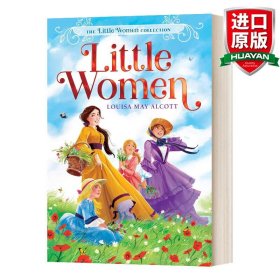

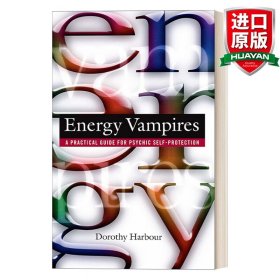

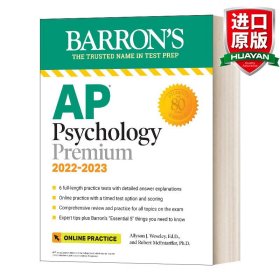
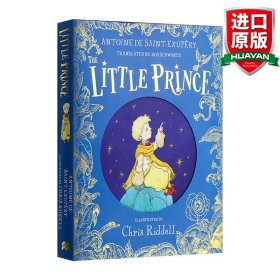
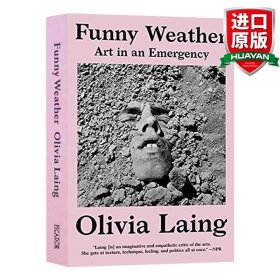
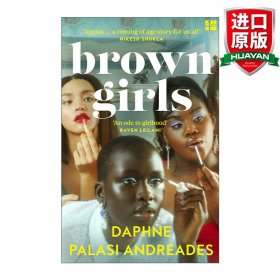


以下为对购买帮助不大的评价